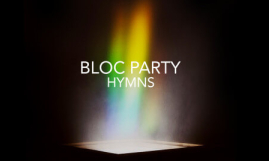
There is nothing, absolutely nothing, as satisfying as holding an irrational prejudice and having it confirmed by sound science.
I've always struggled with modern Christian hymnody. Some of it's great, I know; solidly biblical and the tunes are often lovely. But then much of it is disposable. It's lift music, with no originality about the choice of language, no depth of thought and no real spirituality. It's not about God, it's about us – feelgood pap that would work as a pop song with just a few words altered.
Rant over, and I have time to prepare my excuses before I take my guitar to the next rehearsal of my church's worship group.
But it might be an interesting conversation. Because all my prejudices have been confirmed by research done for the FiveThirtyEight website. Leah Libresco took the lyrics from Billboard's year-end top 50 Christian songs and fed pairs of concepts like life and death, grace and sin into a clever analytical programme. For every pair she checked, the positive words were far more common than the negative ones. There were more than eight mentions of "life" for every instance of "death," and "love" was more than seven times as common as "fear."
She then compared these figures with words from the 19th-century Sacred Harp hymnal, written in the shape-note tradition of musical notation. She says: "For most of the pairs of concepts, the shape-note hymns also had more positively associated words than negative ones, but the shape-note songs aren't as unremittingly positive as the contemporary songs."
And that's my problem with so much modern worship: it's unremittingly positive. Where's the sadness? Where's the lament? Where's the acknowledgment that many of the people in our congregations are broken and hurting, and need words that express how they're feeling? Cheerfulness is all very well, but Jesus was a man of sorrows, not a comedian. I'm all for grace, but but to understand grace you have to understand un-grace. I'm all for forgiveness, but to appreciate forgiveness you have to understand sin.
It would be unfair to single out particular songs popular among evangelical churches. They mean something to those who sing them, and they were written by someone who thought they were doing a good thing, so let them be anonymous (though I'll make an exception for I hear the sound of rustling in the leaves of the trees, which is gibberish).
But here are some questions for ministers and worship leaders.
1. If you include uplifting, feelgood songs in your services – and you should – do you also include songs that speak to people in a different place altogether?
2. Do you consciously filter out songs that are just musical bubblegum, with a good tune but nothing to say?
3. Do you check your music group's output over the course of a month, looking at whether there's a balanced diet of positive and negative, light and shade?
4. Do your songs challenge people about their walk with God?
5. Do they make people think?
There's nothing wrong with singing just for pleasure, even in church. And there's nothing sacred about old hymns just because they're old, either – some of them richly deserve to be forgotten. But music is an important part of most churches' worship, and a congregation deserves the best possible diet.
Follow Mark Woods on Twitter: @RevMarkWoods


















